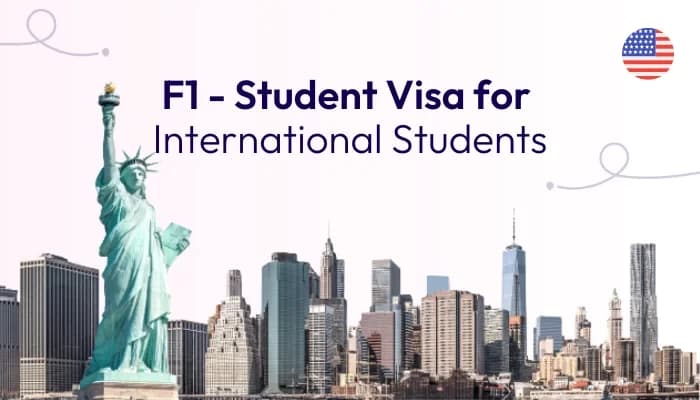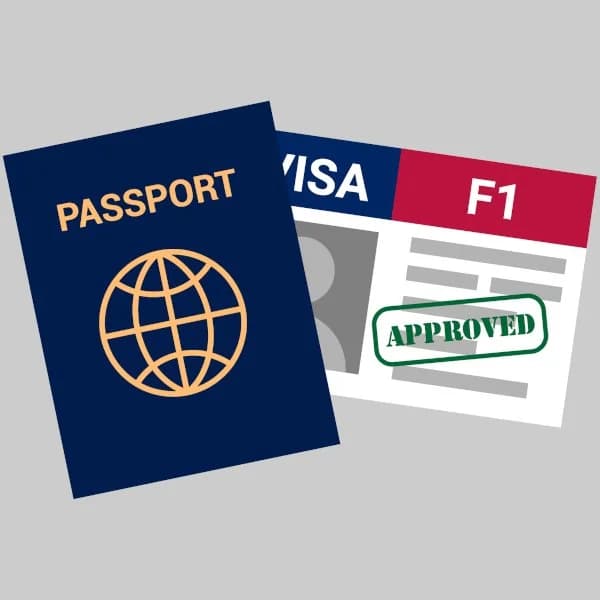F1 Visa Interview: How is this course related to your previous studies?

Key Highlights
- Start with a clear introduction linking your previous education to your future studies.
- Highlight specific courses and skills from your previous education that relate to your new degree.
- Explain how the new degree fits into your long-term career goals.
- Address any gaps or changes in your academic path confidently and honestly.
- Be honest and confident in your response, focusing on the logical progression in your academic journey.
The F1 visa interview can be an overwhelming experience for many students, especially when you’re hit with a critical question like: “How is this course related to your previous studies?” While this might seem tricky at first, it’s actually your opportunity to shine! The consular officer wants to make sure that your academic path is cohesive and well-planned. A well-prepared answer can really make you stand out, proving that you’ve thought through your educational choices and future career goals.
In this article, we’re going to break down exactly how to craft the perfect response to this question. We’ll walk you through a step-by-step approach and provide specific examples so that you can confidently tackle this question in your F1 visa interview.
Why Is This Question So Important?
Before diving into the steps, let’s address the big question: Why does the consular officer care about the connection between your current and previous studies?
Well, it’s simple. They want to see if you have a clear academic plan and are genuinely committed to furthering your education. By connecting your past studies with your future degree, you prove that you aren’t just hopping from one subject to another, but rather, you’ve carefully considered how this new degree will help you achieve your long-term goals.
Now, let’s get into how you can answer this question step by step.
Step 1: Start With a Clear Introduction
When answering this question, the first thing you should do is directly link your previous education to your future studies. You need to clearly state how the two fields are connected and how your new degree will build upon what you’ve learned so far.
Think of your previous studies as the foundation for your future education. You want to show that you’re not starting from scratch but rather expanding on the skills and knowledge you’ve already acquired. Mention specific courses, subjects, or projects from your previous education that naturally lead into your intended degree. This will help the interviewer see the logical progression in your academic journey.
Example:
“I completed my Bachelor’s degree in Mechanical Engineering, where I studied subjects like automation and robotics. My passion for automation led me to apply for a Master’s in Robotics Engineering. This degree will allow me to deepen my understanding of automated systems and robotics technologies, which I’ve been eager to explore further since my undergraduate projects.”
Step 2: Highlight Specific Courses and Skills
The next step is to dive deeper into the specific courses or skills from your previous education that directly relate to your new degree. This not only shows that you’ve been preparing for this transition but also highlights the value of your past education.
Be as specific as possible when talking about your past courses. For example, if you’re transitioning into a new but related field, mention particular subjects that sparked your interest and explain how these will help you excel in your new degree. This shows that your academic journey has been intentional and focused.
Example:
“During my Bachelor’s in Business Management, I took courses in data analytics and market research. These classes introduced me to the importance of data-driven decision-making, which sparked my interest in Business Analytics. Pursuing a Master’s in Business Analytics will give me the advanced skills needed to analyze complex data sets and contribute to data-based solutions in the business world.”
Step 3: Explain How This Degree Fits Into Your Career Goals
It’s not enough to just talk about the connection between your past and future studies—you also need to explain how this new degree fits into your long-term career plans. This is your chance to show the interviewer that you’re not just pursuing this degree because it sounds interesting, but because it’s essential to achieving your career goals.
Link your degree to your career aspirations. Tell the interviewer how your previous studies have prepared you for your future profession and how this new degree will give you the specialized skills or knowledge required for your desired role. By doing this, you show the interviewer that your education is not just an isolated phase but part of a bigger, well-thought-out plan.
Example:
“After completing my Bachelor’s in Environmental Science, I interned with an environmental consulting firm where I worked on climate change projects. This experience inspired me to pursue a Master’s in Environmental Policy and Management so that I can contribute to sustainable policy-making on a larger scale. This degree will equip me with the knowledge and tools needed to make meaningful contributions to climate change policies in both the public and private sectors.”
Step 4: Address Any Gaps or Changes in Your Academic Path
If there’s a significant change in your field of study or a gap between your studies, you need to address it confidently. Be honest about the change, and explain how your new degree will still build on your previous experiences or how your time away from education helped solidify your decision.
Sometimes students switch fields or take time off between degrees. If this applies to you, it’s important to show that even though there’s a gap or shift, your previous studies are still relevant, or your work experience has contributed to your decision to pursue this new path. The key is to provide a clear rationale for the change.
Example:
“After completing my Bachelor’s in Electrical Engineering, I worked in the tech industry for a few years. During that time, I realized the growing importance of AI in engineering solutions. That’s why I’m now pursuing a Master’s in Artificial Intelligence. Although it’s a slight shift from my previous degree, my experience in tech has shown me that AI is the future, and I want to be at the forefront of this field.”
Step 5: Be Honest and Confident
Confidence is key in the F1 visa interview. The interviewer wants to see that you’re sure about your educational and career choices. Be honest about why you’re pursuing this degree and confident in how it fits into your overall plan.
Even if you feel uncertain about how to express the connection between your studies, focus on being genuine and transparent. The interviewer isn’t expecting perfection, but they do want to see that you’ve put thought into your academic choices and that your new degree makes sense in the bigger picture.
Example:
“I earned my Bachelor’s degree in Economics, but during an internship at a tech firm, I realized how much I enjoyed working with data. That’s why I’m pursuing a Master’s in Data Science. Even though my undergraduate studies were in a different field, the analytical skills I developed in Economics will be incredibly valuable in Data Science.”
Sample Answers for F1 Visa Interview
To make this even clearer, here are three sample answers from students with different academic backgrounds:
Sample Answer 1: Business Management to Business Analytics
“I completed my Bachelor’s in Business Management, where I focused on data-driven decision-making in courses like market research and data analytics. These subjects helped me realize how crucial data analysis is in modern businesses, which is why I’m now pursuing a Master’s in Business Analytics. This degree will provide me with the technical skills I need to make data-driven decisions and advance my career in the business world.”
Why This Works: This answer clearly connects past studies to the future degree, and it ties into the student’s long-term career goals, making the academic transition feel natural.
Sample Answer 2: From Biology to Computer Science
“Throughout high school, I was deeply interested in biology and took several advanced courses like Genetics and Molecular Biology. However, during my studies, I became fascinated with how technology can be used to solve complex biological problems, such as through bioinformatics. This interest led me to explore computer science, as I realized how programming and data analysis are critical for developing new technologies in the field of biology. Pursuing a Bachelor’s degree in Computer Science will allow me to combine my passion for biology with cutting-edge technology, enabling me to contribute to innovations at the intersection of these fields.”
Why This Works: This answer effectively bridges the gap between the student’s past interest in biology and their new focus on computer science. It shows a clear progression of interest and explains how the skills and knowledge from biology will enhance their understanding of computer science, particularly in applications like bioinformatics.
Sample Answer 3: Mechanical Engineering to Robotics
“During my Bachelor’s in Mechanical Engineering, I developed a strong interest in automation and robotics through courses like control systems and machine design. I’m now pursuing a Master’s in Robotics Engineering to deepen my understanding of robotics and automation technologies. This degree will allow me to focus on building intelligent systems, which has been a passion of mine since my undergraduate years.”
Why This Works: The student directly links their previous education to their intended degree and provides a clear reason for pursuing robotics based on their past interests.
Final Thoughts
Answering the question “How is this course related to your previous studies?” during your F1 visa interview doesn’t have to be intimidating. By showing a logical connection between your past studies, future degree, and career goals, you can demonstrate to the interviewer that you have a clear and thoughtful academic plan.
Remember, the key is to be clear, confident, and connected in your response. With these steps and examples, you’ll be well-prepared to impress your interviewer and take a significant step toward achieving your academic and professional dreams. Good luck!
Have Questions About This Topic?
Join our community to get personalized advice and share experiences with others going through similar visa processes.




